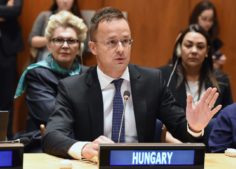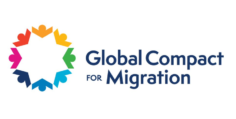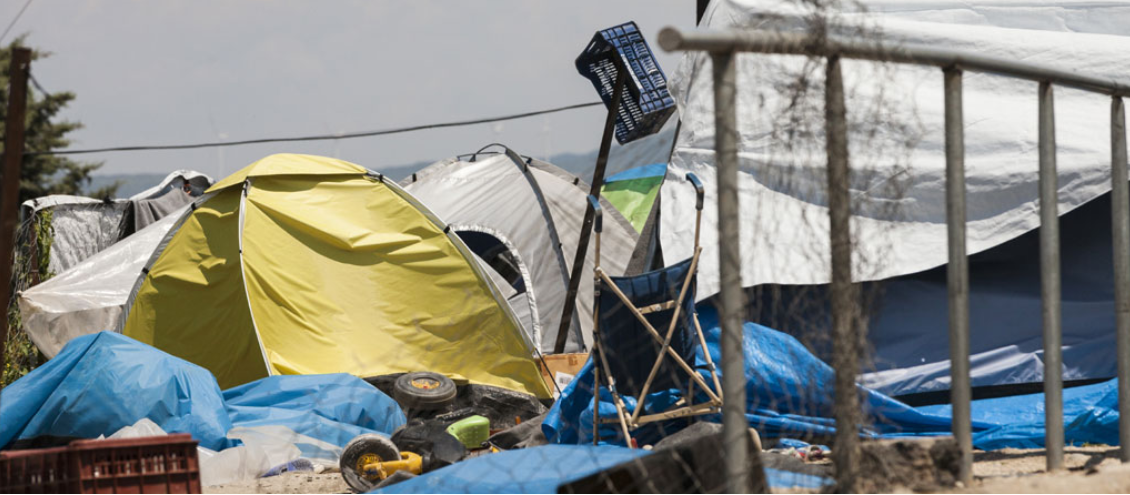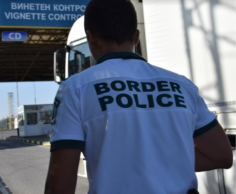UN will soon try to enforce open borders as a ‘human right’
UN member states are expected to sign the so-called “Global Compact for Migration” in December in Morocco, claiming that migration is a “human right”.
Published: October 12, 2018, 8:25 am
German AfD MP Markus Frohnmaier says he is most disconcerted by the latest developments. Piled up on his desk, is a mountain of papers with the headers showing the logo of the United Nations.
“Every MP of Europe, every MEP and even every mayor should be forced to read this”, says 27-year-old Frohnmaier, one of the youngest deputies in the Bundestag.
In September 2017, he was elected to parliament on the list of the Eurosceptic party Alternative für Deutschland (AfD). “If there had not been the AfD in the German parliament, no other political force would dare to criticise this monstrous document.”
The document in question, is the draft text for the so-called Global Compact for Migration for UN member states. It is more or less a globalist project where all signatory states declare their will to abolish the current different categories of migrants in order to declare migration a blanket “human right”.

Hungarian Foreign Minister Peter Szijjarto at the closure of the Intergovernmental Negotiations on the UN Global Compact for Migration. UN Archive
The only leaders unwilling to go along are US President Donald Trump and Hungary’s Prime Minister Viktor Orban. They have both declared that they would not sign the Global Compact.
“This document will enforce migration to Europe. It is open-border propaganda on steroids,” says Frohnmaier. The young politician is part of a European alliance of politicians of sovereignist conservatives who have been organising the political opposition against the “crazy concoction” as Frohnmaier calls the final draft of the Global Compact.
Indeed, if this international agreement is implemented by signatory states, it practically means an end to controlled migration and borders as we we know it. The agreement does not distinguish between refugees and migrants anymore.
Thus even illegal migrants can no longer be deported. In fact, it will be the end of the very notion of an “illegal migrant”. Illegal border crossings will no longer be considered a crime – since migration will be considered to be a “human right”.
The draft for the Global Compact took 18 months to finalise and was approved in July by 191 UN member nations except the United States, which pulled out last year saying it was “inconsistent with US immigration and refugee policies”.
Hungary resisted as well. “This document is entirely against Hungary’s security interests,” said Hungarian Foreign Minister Peter Szijjarto. He described the Compact as an “extreme” measure, which was also “biased and facilitated migration”.
And he added: “This pact poses a threat to the world as it could inspire millions [of migrants].”
Peter Szijjarto is succinct in his condemnation: “Its main premise is that migration is a good and inevitable phenomenon. We consider migration a bad process, which has extremely serious security implications.”
Frohnmaier agrees: “This document is a smoke screen. It describes migration as a pure enrichment for Europe and totally ignores any negative effects on our societies.”
The starting point for the Global Compact was a summit on flight and migration that took place under the aegis of the UN in September 2016, with Barack Obama issuing the invitation.
In contrast to refugee policy, where there are specific global and regional (protection) conventions. The UN refugee body, the UNHCR only monitors observance, as there is no global or UN migration organisation with one set of rules for migration.
The Global Compact for Migration, which essentially comprises 23 goals, claims to focus on protection, the rights and improved living and working conditions of migrants and their families.
Civil society organisations in particular were successful in promoting their goals in the negotiating process. Moreover, the Compact calls for improved data management regarding international migration processes, while it envisions probing economic, environmental as well as political causes of forced migration.
The Compact aims to create a global framework for managing migration, called a “non-legally binding, cooperative framework” to encourage “international cooperation among all relevant actors on migration, acknowledging that no state can address migration alone, and upholds the sovereignty of states and their obligations under international law”.
But the term “non-legally binding” has riled critics such as Frohnmaier. For him such terms are just “soft liberal poetry, a chill pill for those who do not agree with the scandalous content of the Compact”.
The circle of opponents is growing day by day. Austria’s vice chancellor and leader of the conservative Freedom Party, Heinz Christian Strache, said in an interview with the Austrian daily Kronen Zeitung: “Migration should never become a human right.”
Italian Interior Minister Matteo Salvini from the anti-immigration Lega, may not be signing the controversial document either.
But why do so many European and especially German lawmakers support or at least seem wholly unmoved by the Global Compact? Markus Frohnmaier suggests that it is because his European colleagues are so ill-informed: “I doubt that most of the MPs especially from the mainstream parties know about the content of the document. And many of those who know at least the name of the Global Compact, might think it includes a strategy to address the causes of migration.”
The young German politician, who is also a member of the Committee for Economic Cooperation and Development of the Bundestag, doubts too that the Global Compact includes any positive outcomes for the migrants’ countries of origin.
“This is a deeply naïve, almost religious credo of the migration lobby. The opposite will happen: the Global Contract will encourage masses of especially young people to leave their home countries because they believe they will have a better life in Europe. This will drain – and not strengthen – the developing economies in the countries of origin.”
The Inter-Governmental Conference to Adopt the Global Compact for Migration will take place in Marrakech, Morocco on the 10th and 11th of December. Most of the European states will sign the document there.
The Conference will be convened under the auspices of the United Nations General Assembly, held pursuant to resolution 71/1 of 19 September 2016, entitled “New York Declaration for Refugees and Migrants,” which decided to launch a process of intergovernmental negotiations leading to the adoption of the Compact.
Is this the end of borders as we know it? Frohnmaier shakes his head: “The last word has not yet been spoken.”
The young politician is convinced that opposition to such a notion is gathering speed: “More and more Europeans will vote in future for political forces rejecting the open border policy. This process is ongoing and unstoppable.”
And the adopted Global Compact? Frohnmaier smiles ruefully: “A piece of paper.”
All rights reserved. You have permission to quote freely from the articles provided that the source (www.freewestmedia.com) is given. Photos may not be used without our consent.
Consider donating to support our work
Help us to produce more articles like this. FreeWestMedia is depending on donations from our readers to keep going. With your help, we expose the mainstream fake news agenda.
Keep your language polite. Readers from many different countries visit and contribute to Free West Media and we must therefore obey the rules in, for example, Germany. Illegal content will be deleted.
If you have been approved to post comments without preview from FWM, you are responsible for violations of any law. This means that FWM may be forced to cooperate with authorities in a possible crime investigation.
If your comments are subject to preview by FWM, please be patient. We continually review comments but depending on the time of day it can take up to several hours before your comment is reviewed.
We reserve the right to delete comments that are offensive, contain slander or foul language, or are irrelevant to the discussion.

NOAA Predicts Zero Sunspots for Almost the Whole 2030s
CLIMATEThe United States' government scientific organization, the National Oceanic and Atmospheric Administration (NOAA), predicts zero sunspots from 2031 to 2040. This is an extreme situation that has not occurred in as long as humanity has been counting sunspots, and it leads us into uncharted territory in terms of our solar system. However, this prediction aligns with the warnings of the world-renowned solar researcher Valentina Zharkova for many years, who indicated in 2019 various signs of this catastrophic phenomenon, including the extreme hailstorms we have seen in Europe and the world this summer. The forecast and various observations this year give cause for very significant concern. In this unique analysis, Free West Media explains why.

European Nationalist Parties Forge Cooperation Ahead of EU Elections
EUROPEAN ELECTIONSOn Saturday, August 26, representatives of six European nationalist parties gathered in Budapest. The meeting was initiated by the Hungarian party Mi Hazánk and took place in the national parliament. Representatives of the parties signed a joint declaration that not only reaffirms the parties' friendship but also their unity on a range of complex political issues. A surprisingly clear and radical manifesto was established. The hope is that this cooperation will lead to success in the EU elections and eventually result in the formation of a group in the European Parliament. For Swedish nationalism, this meeting marks a success as Sweden, for the first time, has a party represented in a leading nationalist cooperation in Europe. Free West Media was present at this historic event.

Turkey Believes Sweden Hasn’t Done Enough
Sweden will have to wait a bit longer for NATO membership, according to Turkey's Justice Minister Jilmaz Tunc. First, Sweden must extradite the "terrorists" Turkey wants and stop the desecration of the Quran.

Swedish Weapon Takes Down Russia’s Best Attack Helicopter
The Russian attack helicopter Ka-52 is considered one of the world's best and has struck fear in Ukraine, where it has hunted down tanks and other armored vehicles, often beyond the range of many light anti-aircraft systems. However, it has met its match in the Swedish air defense missile system RBS 70, which has quickly led to significant losses for the Russian helicopter forces.

Strong Confidence in German AfD
Alternative for Germany (AfD) held a party conference on July 29-30 to select candidates for the upcoming EU election next year. EU Parliament member Maximilian Krah, belonging to the party's more radical, ethnonationalist faction, was appointed as the top candidate. The party's two spokespersons delivered powerful speeches criticizing the EU's failed migration policy and trade sanctions that isolate Europe and Germany from the rest of the world. They argued that it's time for the EU to return a significant portion of its power to national parliaments. However, they have dropped the demand for Germany to exit the EU.

The Establishment Wants to Ban Germany’s Second Largest Party – for the Sake of Democracy
The rising popularity of AfD has raised strong concerns within the establishment. Despite lies and demonization in the media and isolation from the overall political establishment, the party continues to grow. Certain representatives of the party are accused of becoming increasingly "extreme," and in an unusual move, the influential weekly newspaper Der Spiegel demanded that AfD be "banned."

Dutch FvD break through the media blockade
What is happening in the Netherlands? It is often difficult to follow events in other countries, especially when distorted by system media. We give Forum for Democracy (FvD) the opportunity to speak out on the political situation in the Netherlands and the staunch resistance they face in trying to save the country.

The Ursula von der Leyen Affair
After a criminal complaint in Belgium against the President of the European Commission, the so-called SMS-case, now takes a new turn. The judge responsible for the investigation will likely gain access to the secret messages exchanged between Ursula von der Leyen and Albert Bourla, CEO of Pfizer, at least if they haven't been deleted.

Publisher of Unique Literature Worldwide Blocked by International Distributor
Arktos has distinguished itself by publishing groundbreaking philosophers and social critics. Now, the publisher's international distributor has abruptly terminated the cooperation, and more than 400 already printed titles cannot reach their audience. There is strong evidence that the distributor has been under pressure, something that has also happened in Sweden. We have spoken with Arktos founder Daniel Friberg about the ongoing struggle for freedom of speech in a shrinking cultural corridor.

Care prompts bishops to criticize transgender ideology
The Catholic bishops of the Scandinavian countries presented an open five-page letter criticizing transgender ideology on March 21, just before Easter. The document primarily expresses care and advice and was read aloud in Catholic churches in Sweden, Norway, Finland, Denmark, and Iceland. Cardinal Anders Arborelius, Bishop of Stockholm, is one of the signatories of the document.







